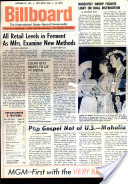WCAR LIVES HERE 24/7 ON MOTOR CITY RADIO FLASHBACKS
From our MCRFB aircheck archives featuring: WCAR-AM (’71) w/ RAY OTIS
![]()
 From the MCRFB NEWS archive: 1963
From the MCRFB NEWS archive: 1963
Concept Top 40 Music Geared ‘For Only Youngsters’ Generally Program Misread
From the Desk of Bill Gavin Billboard Contributing Editor
SAN FRANCISCO — The acid test of music policy is competition. A station will grow fat on its ratings as long as its competitors are fumbling. Sooner or later another station or two in the market is bound to sharpen up its operation, and the ratings picture begins to change.
 F o r r e a s o n s n o t c l e a r l y understood, top 40 revenues are considerably more vulnerable to rating declines than are the comfortable monthly billings of their more conservative colleagues. Advertisers appear to believe that on a good music station they are buying prestige, whereas on a top 40 station they are buying a predictable number of ears. The attitude apparently prevails that most of the modern sounds of today’s popular records are somehow disreputable, connoting cheapness and inferiority. Irrational as it may seem, this advertiser attitude exists, and because of it, top 40 music must deliver those ratings — or else!
F o r r e a s o n s n o t c l e a r l y understood, top 40 revenues are considerably more vulnerable to rating declines than are the comfortable monthly billings of their more conservative colleagues. Advertisers appear to believe that on a good music station they are buying prestige, whereas on a top 40 station they are buying a predictable number of ears. The attitude apparently prevails that most of the modern sounds of today’s popular records are somehow disreputable, connoting cheapness and inferiority. Irrational as it may seem, this advertiser attitude exists, and because of it, top 40 music must deliver those ratings — or else!
To many thoughtful radio people, this advertiser antipathy towards today’s popular music makes little sense. Popular records are not the exclusive province of the teenager. Agency media buyers know, from impartial research studies, that most top 40 audiences contains a majority of adults. In spite of this, agency people are still prone to evaluate top 40 as “kid’s music.”
I n m y o p i n i o n , this confused image is mainly the fault of top 40 personnel themselves, aided to be sure by the caustic critics of the press and of the competition. Far too many top 40 stations emphasize teen appeal out of all proportion to their audience potential. “Dedication” shows are a case in point. Bulletins audibly flashed about how seventh grade Lucy isn’t mad at Joe any more, or how all the girls in the eighth grade think that Tom is a “darling” can be pretty nauseating to listeners who are over 18 years of age. It is not necessary for a station to sound juvenile in order to please its younger listeners.

From time to time we hear of a top 40 station that is changing its music policy because its revenues are inadequate. Others change because of ratings inroads by the competition are in place within their own respective market. Such changes, either in a smooth sound or hard rock direction, run the risk of lower ratings without compensating revenue gains.
It is possible that the doctors who have proscribed the change have incorrectly diagnosed the illness. Radio “experts” make music policy their favorite whipping boy. In many cases a re-orientation of the station’s air presentation, or of its community image, can solve the problem without tinkering with the music.
M u s i c p o l i c y d o e s o c a i s s i o n a l l y require modifications to meet changed conditions. In the event of a competitive challenge, however, it’s a good idea to take a long, hard look at the many other factors involved in a station’s public acceptance.
When music policy does need revision, it is well to consider the changes most carefully. Amateur tinkering is worse than useless. The wise manager has a specific objective and then makes certain that the people making the changes are moving intelligently in the right direction. Change should be made with a purpose, not out of panic. END
___
(Information and news source: Billboard; September 28, 1963)
![]()
![]()
https://www.youtube.com/watch?v=7emtx8dQCEY
![]()